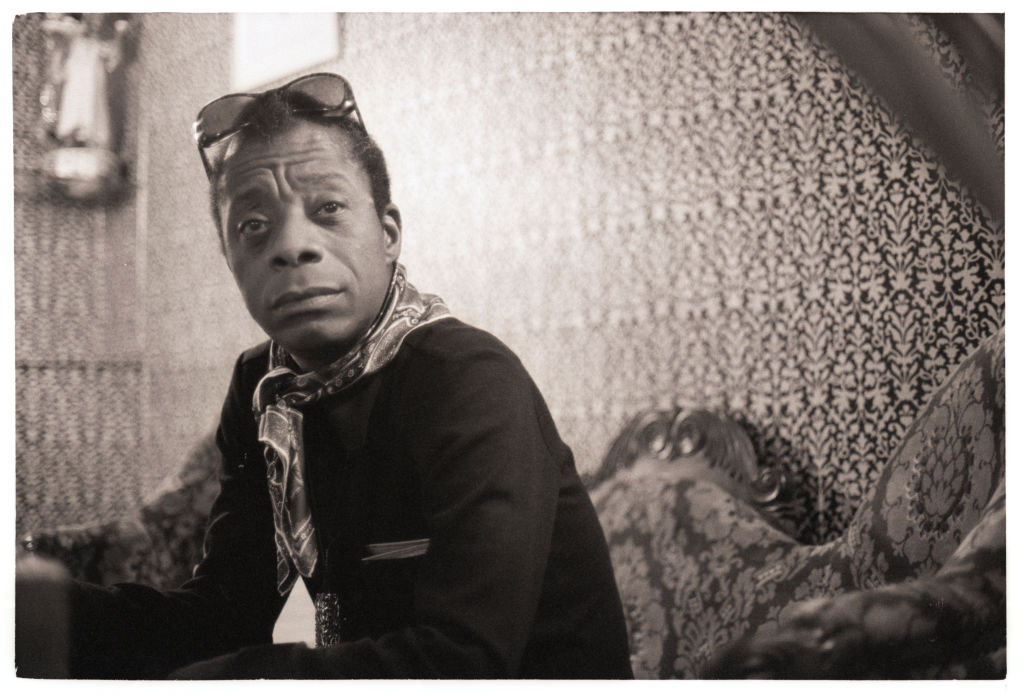
Source: Sophie Bassouls / Getty
The state of antisemitism within the Black community has been under a microscope for far longer than the controversies stirred up by the rapper formerly known as Kanye West and NBA star Kyrie Irving, whose recent actions and commentary have led to swift consequences.
While Kanye, who now goes by just Ye, and Irving have breathed new life into decades-old anti-Jewish tropes, an essay penned by James Baldwin more than 55 years ago shows that there’s nothing new under the sun.
The iconic writer tried his hand at contextualizing the perception that Black people are antisemitic in a personal essay published in the New York Times in 1967 and offered a conclusion that seems to gibe with at least some of what Ye has said and themes explored in the controversial film Irving shared on Twitter.
Now, with both Ye and Irving paying the price — literally and figuratively — for their roles in separate but related ongoing and widening antisemitic scandals, reflecting on what Baldwin had to say could surprise some. Beyond that, though, it could also help explain — not excuse — the behavior that both Ye and Irving have displayed that prompted the severe blowback threatening their careers each is experiencing.
Here’s what James Baldwin had to say about antisemitism within the Black community as he explained in the New York Times.
The role Christians play in antisemitism
Anti-Semitism among Negroes, inevitable as it may be, and understandable, alas, as it is, does not operate to menace this control, but only to confirm it. It is not the Jew who controls the American drama. It is the Christian.
The root of anti-Semitism among Negroes is, ironically, the relationship of colored peoples–all over the globe–to the Christian world. This is a fact which may be difficult to grasp, not only for the ghetto’s most blasted and embittered inhabitants, but also for many Jews, to say nothing of many Christians. But it is a fact, and it will not ameliorated–in fact, it can only be aggravated–by the adoption, on the part of colored people now, of the most devastating of the Christian vices.
It is true that two wrongs don’t make a right, as we love to point out to the people we have wronged. But one wrong doesnít make a right, either. People who have been wronged will attempt to right the wrong; they would not be people if they didn’t. They can rarely afford to be scrupulous about the means they will use. They will use such means as come to hand. Neither, in the main, will they distinguish one oppressor from another, nor see through to the root principle of their oppression.
The role race plays in antisemitism
…the most ironical thing about Negro anti-Semitism is that the Negro is really condemning the Jew for having become an American white man–for having become, in effect, a Christian. The Jew profits from his status in America, and he must expect Negroes to distrust him for it. The Jew does not realize that the credential he offers, the fact that he has been despised and slaughtered, does not increase the Negro’s understanding. It increases the Negro’s rage.
The role nationalism plays in antisemitism within Black people
For it is not here, and not now, that the Jew is being slaughtered, and he is never despised, here, as the Negro is, because he is an American. The Jewish travail occurred across the sea and America rescued him from the house of bondage. But America is the house of bondage for the Negro, and no country can rescue him. What happens to the Negro here happens to him because he is an American.
…
…no one has ever seriously suggested that the Jew be nonviolent. There was no need for him to be nonviolent. On the contrary, the Jewish battle for Israel was saluted as the most tremendous heroism. How can the Negro fail to suspect that the Jew is really saying that the Negro deserves his situation because he has not been heroic enough? It is doubtful that the Jews could have won their battle had the Western powers been opposed to them. But such allies as the Negro may have are themselves struggling for their freedom against tenacious and tremendous Western opposition.
This leaves the American Negro, who technically represents the Western nations, in a cruelly ambiguous position. In this situation, it is not the American Jew who can either instruct him or console him. On the contrary, the American Jew knows just enough about this situation to be unwilling to imagine it again.
On the similarities between Black people and Jews
They arrived here out of the same effort the American Negro is making: they wanted to live, and not tomorrow, but today. Now, since the Jew is living here, like all the other white men living here, he wants the Negro to wait. And the Jew sometimes–often–does this in the name of his Jewishness, which is a terrible mistake. He has absolutely no relevance in this context as a Jew. His only relevance is that he is white and values his color and uses it.
On the differences between Black people and Jews
He is singled out by Negroes not because he acts differently from other white men, but because he doesn’t. His major distinction is given him by that history of Christendom, which has so successfully victimized both Negroes and Jews. And he is playing in Harlem the role assigned him by Christians long ago: he is doing their dirty work.
On the future of Black-Jewish relations
A genuinely candid confrontation between American Negroes and American Jews would certainly prove of inestimable value. But the aspirations of the country are wretchedly middle-class and the middle class can never afford candor.
The ultimate hope for a genuine black-white dialogue in this country lies in the recognition that the driven European serf merely created another serf here, and created him on the basis of color. No one can deny that that Jew was a party to this, but it is senseless to assert that this was because of his Jewishness.
Ye’s ‘jealous’ comments reflected in Baldwin’s prose
All racist positions baffle and appall me. None of us are that different from one another, neither that much better nor that much worse. Furthermore, when one takes a position one must attempt to see where that position inexorably leads. One must ask oneself, if one decides that black or white or Jewish people are, by definition, to be despised, is one willing to murder a black or white or Jewish baby: for that is where the position leads. And if one blames the Jew for having become a white American, one may perfectly well, if one is black, be speaking out of nothing more than envy.
If one blames the Jew for not having been ennobled by oppression, one is not indicting the single figure of the Jew but the entire human race, and one is also making a quite breathtaking claim for oneself. I know that my own oppression did not ennoble me, not even when I thought of myself as a practicing Christian. I also know that if today I refuse to hate Jews, or anybody else, it is because I know how it feels to be hated. I learned this from Christians, and I ceased to practice what the Christians practiced.
The crisis taking place in the world, and in the minds and hearts of black men everywhere, is not produced by the star of David, but by the old, rugged Roman cross on which Christendom’s most celebrated Jew was murdered. And not by Jews.
SEE ALSO:
Amid Kyrie Irving Suspension, Amazon Is Still Profiting From Antisemitic Movie NBA Star Tweeted
Kanye West’s Net Worth Plunges Amid Ye Antisemitism Scandal
The post What James Baldwin Said About Antisemitism In The Black Community appeared first on NewsOne.

